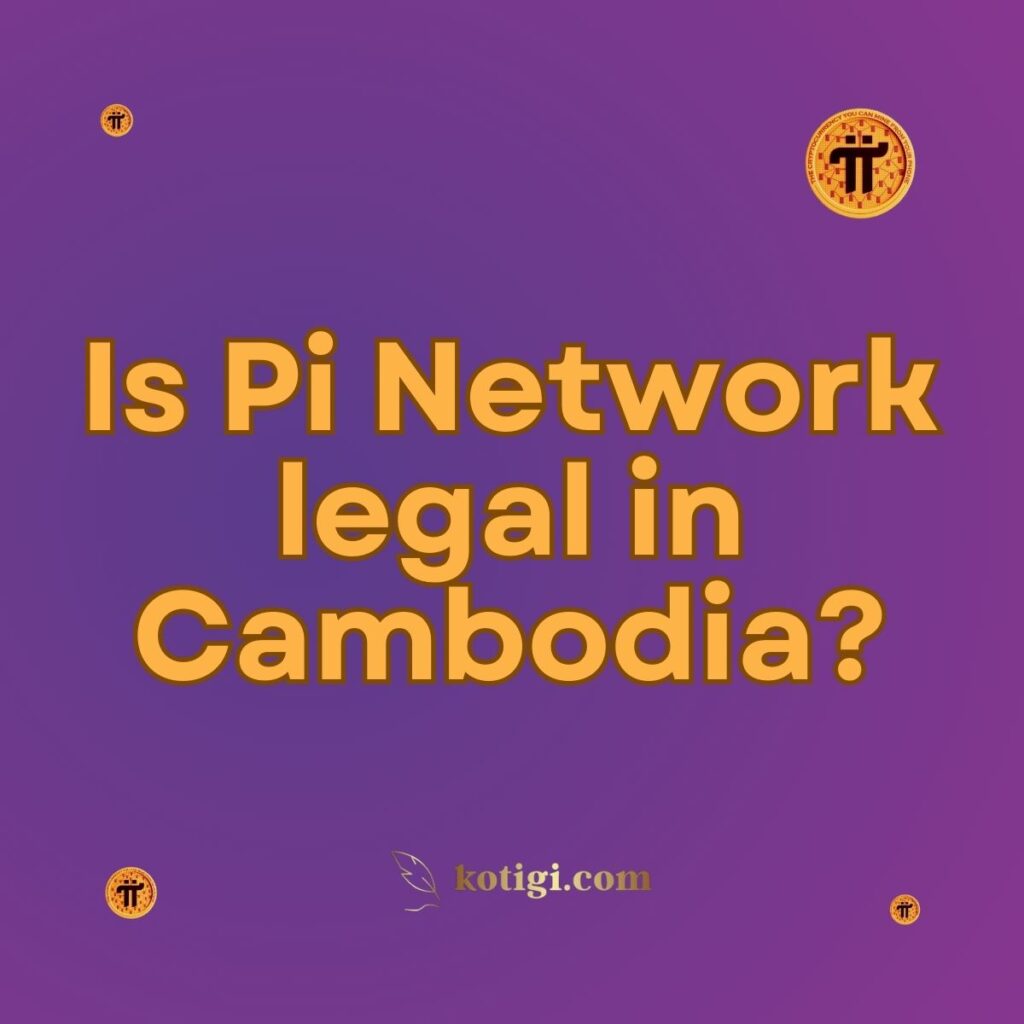
Is Pi Network legal in Cambodia?
Pi Network is not illegal in Cambodia, but it operates in an uncertain regulatory environment. Cambodia has not issued specific laws governing Pi Network or cryptocurrencies in general. However, the Cambodian government has warned against unregulated cryptocurrencies, urging caution among users.
Introduction
The rise of Pi Network has sparked interest in Cambodia, but many users are curious about its legal standing. As with many countries, Cambodia has yet to develop clear regulations regarding cryptocurrencies. While Pi Network is not officially banned, the government’s cautious approach to digital currencies has created uncertainty for users.
This article will examine the current legal status of Pi Network in Cambodia, government warnings about cryptocurrencies, and what users should consider when engaging with the platform in the country.
Cryptocurrency Regulation in Cambodia
No Specific Cryptocurrency Legislation
At present, Cambodia does not have specific legislation that regulates cryptocurrencies like Pi Network. As a result, platforms such as Pi Network operate in a legal gray area. Cambodians can participate in the network without violating any laws, but they do so at their own risk due to the absence of clear regulatory guidelines.
Without specific cryptocurrency laws, there is little legal protection for users in case of disputes or issues with the platform, which can make participation riskier.
National Bank of Cambodia’s Stance on Cryptocurrencies
While Cambodia has no comprehensive cryptocurrency laws, the National Bank of Cambodia (NBC) has issued several warnings against the use of unregulated cryptocurrencies. In 2018, the NBC, along with other financial authorities, stated that the use of digital assets for payments is prohibited. However, this warning did not explicitly target Pi Network or similar platforms.
The NBC’s warnings highlight the potential risks of using digital currencies, such as fraud, volatility, and money laundering. This cautious stance reflects the government’s concern over the unregulated nature of cryptocurrencies and their potential impact on Cambodia’s financial system.
Pi Network’s Role in Cambodia’s Financial System
Mobile Mining and Its Legal Position
Pi Network uses a unique mobile mining model, which allows users to earn Pi coins without needing significant financial investments or energy-consuming mining operations. Since the platform does not facilitate financial transactions or operate as a payment processor, it may avoid some of the legal scrutiny applied to other cryptocurrencies.
However, once Pi Network transitions to its mainnet and the coins become tradable, the Cambodian government may revisit its stance on the platform. At present, users should be cautious about the evolving legal framework around Pi Network’s future operations in Cambodia.
Cambodia’s General Approach to Cryptocurrencies
The Cambodian government’s approach to cryptocurrencies is one of caution rather than strict prohibition. While the government has not banned cryptocurrencies outright, its repeated warnings suggest that authorities are wary of the risks posed by unregulated platforms.
For Pi Network users in Cambodia, this cautious environment means that while they can engage with the platform without immediate legal repercussions, they should be aware that the government could introduce regulations in the future that may affect their participation.
Legal Risks for Pi Network Users in Cambodia
Unregulated Market Risks
Since Pi Network operates in an unregulated market, users in Cambodia face significant risks. Without regulatory oversight, users have no legal recourse if they encounter issues with the platform, such as fraud or lost coins. Additionally, the lack of regulations makes it difficult for users to know whether their actions are compliant with potential future laws.
Cambodian authorities may also choose to introduce regulations or restrictions on cryptocurrency platforms as Pi Network develops and its coins become tradable. Users should be prepared for the possibility of new laws affecting their participation in the network.
Potential for Future Cryptocurrency Regulations
Cambodia’s government has expressed concerns about the use of unregulated cryptocurrencies. While there are currently no specific regulations targeting Pi Network, future laws could impose restrictions or new requirements on digital currencies. The government’s cautious stance suggests that more comprehensive regulations could be on the horizon as cryptocurrencies gain popularity in the country.
For now, Pi Network users in Cambodia should remain vigilant and stay informed about potential legal developments to avoid running afoul of any future laws.
Regional and Global Trends Affecting Cambodia
Southeast Asia’s Regulatory Landscape
In the broader Southeast Asian region, countries have adopted varying approaches to regulating cryptocurrencies. For example, Singapore has developed a clear legal framework for cryptocurrencies, while Thailand has imposed stricter regulations, particularly regarding Initial Coin Offerings (ICOs) and trading.
Cambodia may look to its regional neighbors for guidance on how to regulate digital currencies in the future. As regional trends shift toward greater regulatory oversight, Pi Network users in Cambodia should stay informed about developments in neighboring countries that may influence Cambodia’s future policies.
Global Cryptocurrency Regulations
Around the world, countries are developing different approaches to regulating cryptocurrencies. For instance, China has banned all cryptocurrency transactions, while the United States is working toward a more balanced regulatory framework. These global trends could impact how Cambodia views and regulates platforms like Pi Network in the future.
Pi Network users in Cambodia should be aware of both regional and global regulatory trends, as they may shape the government’s approach to digital currencies over time.
The Future of Pi Network in Cambodia
Will Cambodia Regulate Pi Network?
While Pi Network is currently operating without legal restrictions in Cambodia, the platform may face new challenges as it evolves and its coins become tradable. As Cambodia’s cryptocurrency market grows, the government may introduce regulations aimed at providing clearer guidelines for platforms like Pi Network.
For now, Pi Network users in Cambodia can participate in the network without facing legal issues. However, they should be cautious and stay informed about potential regulatory changes that could affect the platform in the future.
Importance of Staying Updated
As the cryptocurrency landscape continues to evolve globally and in Southeast Asia, Pi Network users in Cambodia must stay informed about new developments. Monitoring both local and regional trends will help users navigate any legal changes and ensure they remain compliant with future regulations.
As Pi Network approaches its mainnet launch and the coins become tradable, legal considerations will become increasingly important for users in Cambodia.
Caution for Pi Network Users in Cambodia
Lack of Legal Protections
Since Pi Network operates in an unregulated market in Cambodia, users have limited legal protections. If users encounter issues such as fraud, lost coins, or platform disputes, they may not have any recourse under Cambodian law.
To minimize these risks, Pi Network users should be cautious about how much they invest in the platform and should remain aware of potential legal changes that could impact their participation in the future.
Staying Informed on Regional and Global Trends
Pi Network participants in Cambodia should keep a close eye on regional trends, particularly in neighboring countries like Thailand and Singapore, as well as global regulatory shifts. By staying updated on how other countries are regulating cryptocurrencies, users can better prepare for potential legal changes in Cambodia and ensure they remain compliant.
Conclusion
Pi Network is currently legal in Cambodia, but the absence of cryptocurrency-specific regulations places it in a legal gray area. While Cambodian users can engage with Pi Network without breaking any laws, they should be mindful of the government’s cautious stance on cryptocurrencies and the potential for future regulations.
As the platform evolves and its coins become tradable, Pi Network users in Cambodia should stay informed about legal developments both locally and globally to ensure compliance and avoid legal risks.
Key Takeaways
- No Specific Cryptocurrency Laws: Cambodia does not have specific laws regulating Pi Network or cryptocurrencies, placing them in a legal gray area.
- Government Warnings: The National Bank of Cambodia has issued warnings about the risks of using unregulated digital currencies, but there is no outright ban.
- Future Regulations Likely: As cryptocurrency adoption grows, Cambodia may introduce new regulations that could impact Pi Network’s operations and its users.
- Stay Informed: Pi Network users should monitor local, regional, and global trends to remain compliant with potential future laws.
- Unregulated Market Risks: Users should be cautious as Pi Network operates in an unregulated environment with limited legal protections in Cambodia.





